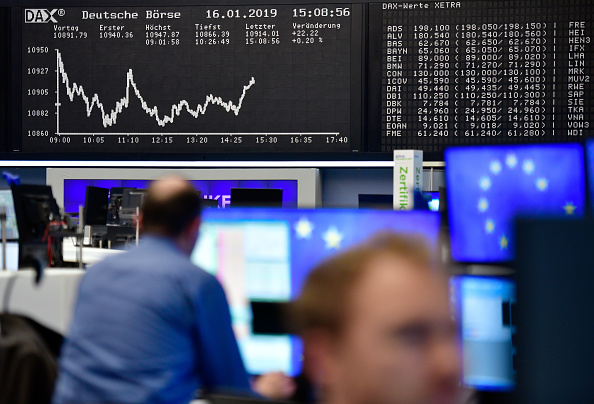European stock markets tentatively rise as China stems currency fall

European stock markets have broadly risen this morning on signs that the People’s Bank of China has stemmed the fall of the renminbi after the US officially labelled China a currency manipulator.
Read more: Tumbling Chinese currency drags down stock markets on trade war fears
China’s currency fell to the seven-per-dollar level not seen since the financial crisis yesterday, sparking a sell-off in equities. Investors believed the depreciation ended any chance of a trade deal between the two sides.
The fall prompted the US Treasury Department to officially accuse China of manipulating its currency. The move could open the way for the US to slap more punitive tariffs on Chinese goods.
The latest escalation in the ongoing trade war between the world’s two biggest economies came after US President Donald Trump last week slapped 10 per cent tariffs on $300bn of Chinese goods, meaning effectively all China’s exports to the US are now levied.
This morning China said its companies are to stop buying US agricultural products in retaliation for the tariffs. Chinese tariffs on the US’s valuable soybean exports have already caused the Trump administration to spend tens of billions of dollars compensating farmers.
Yet European stock markets opened higher this morning, except for Britain’s FTSE 100, which found itself down 0.1 per cent due to no-deal Brexit fears and a stronger pound.
After a day of sharp falls yesterday, Germany’s Dax rose 0.2 per cent, France’s CAC 40 climbed 0.4 per cent, and the pan-European Euronext 100 rose 0.1 per cent this morning.
The on-shore renminbi, which China allows to fluctuate two per cent either side of a set figure, climbed 0.2 per cent by 9.30am UK time so that one dollar bought 7.034 yuan, the unit of the renminbi.
“It would appear that the Chinese are sending a message in its decision to fix the yuan higher than expected,” said Michael Hewson of CMC Markets.
“In pulling the yuan higher it is not only looking to manage any decline, but also looking to contain any damage in terms of confidence in their stewardship of the Chinese currency and economy.”
“It also buys time for cooler heads to prevail when it comes to escalating events further, however given the US President’s track record on escalations that seems doubtful.”
Asian stock markets fell sharply overnight, with Shanghai’s SSE Composite index shedding 1.6 per cent. Hong Kong’s Hang Seng dropped 1.1 per cent, while Japan’s Nikkei fell 0.7 per cent.
The falls followed a bruising day for US equities which saw the tech-heavy Nasdaq plummet 3.5 per cent, the S&P 500 fall three per cent, and the Dow Jones industrial average drop 2.9 per cent.
Read more: Donald Trump accuses Beijing of currency manipulation
The sell-off of equities caused investors to buy up safer assets, sending yields on 10-year US government bonds falling and the Japanese yen rising.